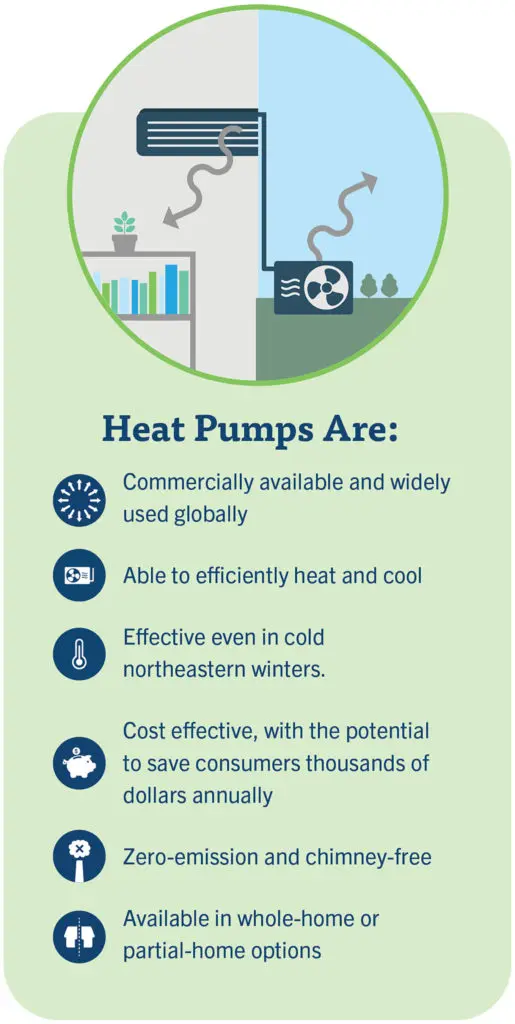Clearing the Path for Clean Heating
With the winter solstice just around the corner, the Northeast’s heating season is in full swing and greenhouse gas emissions (GHGs) from buildings are at their seasonal high. About 85% of homes in New England and New York rely on fossil fuels for heating, and this consumption accounts for about 30% of total regional GHGs. Fossil fuel use for heating also poses health and safety dangers like carbon monoxide poisoning and risk of explosion. The average home in the Northeast spends $1,000-$2,600 on heating fuel every winter, and because the Northeast imports all of its fossil fuels, this money flows out of local economies and the region is beholden to price fluctuations out of its control.
A clean alternative to fossil fuel heating is efficient, electric heat pumps.
What is a Heat Pump and What Are Its Benefits?
A heat pump is an electric heating and cooling technology for buildings that works by moving heat between the inside and outside of a building. A standard air conditioner is a type of heat pump that extracts heat from inside a building and moves it outside. A heat pump uses this same cooling process in the summer, and it is able to reverse the process in the winter for heating.
Heat pumps offer many benefits over fossil fuels, including:

- Pollution reduction and improved health and safety – Full replacement of an existing heating system with heat pumps can reduce greenhouse emissions 60-70%, depending on the fuel being displaced. In MA, HVAC improvements in low income homes led to $265 in annual health and safety savings per household.
- Winter fuel savings – Fully converting an oil or propane-heated home to heat pumps can save residents between $800-1600 on average.
- Avoided natural gas infrastructure – Customers can access greater fuel savings and cut pollution more by converting to heat pumps rather than natural gas. Plus, converting homes to heat pumps does not require addition of new gas pipes, which lock in higher greenhouse gas emissions for decades and increase costs for all gas customers because the utility passes on these infrastructure costs.
Clearing the Path for Clean Heating
No state or city can reach its climate and clean energy goals if fossil fuel heating continues. With their significant pollution and consumer benefits, heat pumps deserve to be more widely adopted in the Northeast. Acadia Center supports 7 key solutions to overcoming barriers to heat pump adoption:
- Educating consumers and vendors
- Coupling heat pumps with home efficiency
- Installing only clean electric heating in new homes
- Decreasing operating costs through smart electricity pricing
- Removing incentives to promote natural gas
- Aligning retrofit incentives with state policy objectives
- Establishing state-level thermal decarbonization targets
Acadia Center is in the final stages of developing a report called “Clean Heating Pathways” that identifies supportive policies across New England and New York to accelerate these 7 solutions and compares state progress to advance clean heating.
by Emily Lewis O’Brien, Director, Climate and Energy Analysis (CLEAN) Center and Matt Rusteika, Senior Policy Analyst



















Follow us